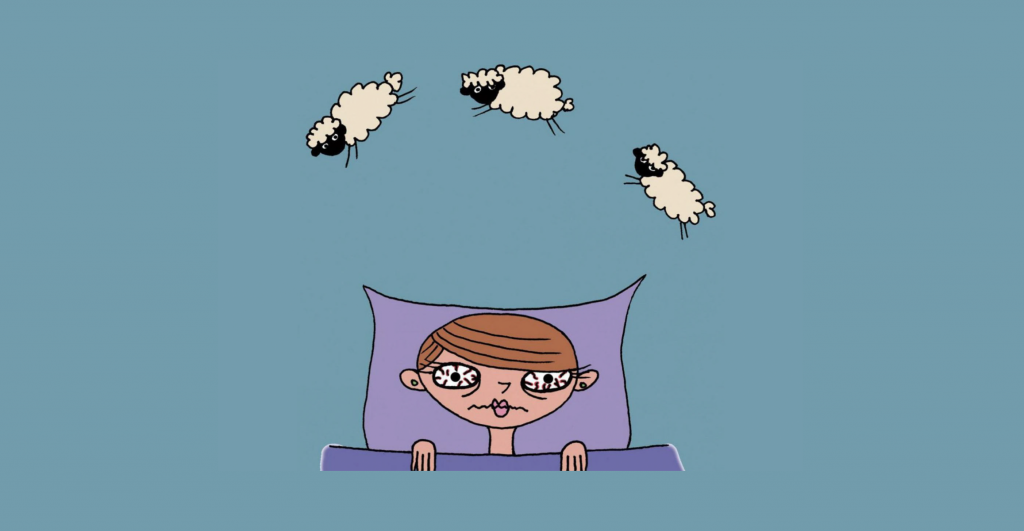
The beginning of the year 2020 was expected to be a time to thrive, but the novel Coronavirus swept in, bringing death and demise with it. Information on COVID-19 symptoms and general updates have been constant reminders for us all, but what lies beneath the physical and psychological tolls is a foundation for maintaining our health: proper sleep. Sleep functions in restoration, regeneration, and memory consolidation. Through the secretion of hormones during sleep, our bodies are able to repair damaged cells and clear out toxic debris from our brains. Our memories are also sorted from short term memory into long term, as the information is processed. Sleep is necessary, especially in times like these. A good night’s sleep gives us strong immune systems, keeping us healthy and giving us more fulfilling lives. Investigating sleep issues amidst the ongoing pandemic is therefore critical for our health. Dr. Phillip Cheng argues that sleep maladies due to the presence of the coronavirus are rampant: “Everything going on right now can make people more vulnerable to insomnia.”1 However, sleep deprivation isn’t a new issue according to the CDC, and sleep expert Dr. Neil Stanley has stated that sleeping in due to COVID confinement is beneficial to stabilizing sleep.2 But has the quality of sleep actually increased due to COVID-19, as Dr. Stanley suggests, or worsened, as Dr. Cheng suggests? While sleep quality can be manipulated by a number of different factors, an analysis of the data suggests that indeed the ongoing pandemic has been generally responsible for critical sleep problems affecting health.
The environment presented by COVID-19 has brought radical change. With the constant news reports, the rise of COVID-19 cases, the fear of losing a loved one, and the fear of missing out of our own lives have played major roles in inducing anxiety. Missing out on normal events such as graduations, weddings, family visits, and more lead many to experience isolation and loneliness, leading to increasing stress and anxiety. While feeling anxious is a natural response the body sends out when it is under stress, those with severe anxiety disorders are suffering, and it’s affecting daily function. Anxiety has also been a main contributor to sleep disturbances like insomnia. Insomnia is one of the most common sleeping disorders, characterized by trouble falling and staying asleep, and it is in a toxic cycle with anxiety.3 As a result of the new world created by this ongoing pandemic, immense stress from anxiety over the disease have made it harder to sleep (insomnia), which has led experts to call this new condition Coronasomnia. At the onset of the viral outbreak, a study was conducted in China to see how sleep was being affected using several tests: the Insomnia Severity Index, Patient Health Questionnaire, Generalized Anxiety Disorder Scale, and Acute Stress Disorder Scale. Experts found that insomnia had increased by 20%, supporting the view that COVID-19 has impacted sleep through anxiety.4 Dr. Donn Posner adds that the pandemic allows for a “perfect storm of sleep problems.”5
While these studies show that this new era with COVID-19 has made sleep issues rampant, sleep as a whole is an extremely fragile state that can be affected by many factors. Before listing off such factors, it is important to understand the science behind sleep. Composed of five stages, this complex activity works rigorously to maintain balance within our body and brain. These stages are divided into non-REM and REM (or Rapid Eye Movement) cycles, where dreaming occurs, and one cycle is about 90 minutes.6 Contrary to the saying that “sleep is for the weak,” it is one of the most productivity-fueled events of our lives. Such productivity slows as we age, which explains why infants need seventeen hours of sleep, young adults need eight, and so on. Professor Alice Gregory states that sleep changes throughout our lifetime, and that disturbances are also normal in different stages of our lives.7 And so, the major factors affecting sleep include stress, medications, substance abuse, and light exposure. When these factors get in the way of proper sleep, a range of issues can occur affecting memory, heart health, and cognitive function.8 Sleep deprivation as a whole has been a problem growing in the dark, with the first National Sleep Alert being issued in 1993, and in 2014, the CDC declared that insufficient sleep was becoming an epidemic.9 Another problem arising in recent years has been the so-called “blue light fatigue,” promoted by our modern age of technology, which has increased everyone’s computer screen time. Therefore, it would be premature to directly link current sleeping problems alone with COVID-19.

However, since the onset of COVID-19, researchers have worked strenuously to find out as much as possible about the virus, and in doing so, we know that fatigue plagues patients inflicted with the virus. The immune system and respiratory tract are known as the main points of attack by Coronavirus, and disruptions of the respiratory tract also disrupts sleep. Like the vicious cycle of anxiety and insomnia, breathing problems make sleeping difficult. Persistent breathing issues may cause long term breathing-related sleep disorders.10

While COVID patients cycle with poor sleep, quarantine confinement has affected the mental health of the general population, also resulting in reports of poor sleep. Humans are social animals, so it is no surprise that isolation from society causes disruptions in mental stability. With lots of free time in isolation, and lacking normal social interactions, we are left alone with our thoughts—thoughts that can quickly become intrusive and spur anxiety as well as depressive episodes. Studies have shown that anxiety as well as sleep issues were present in high levels for those isolated just for 14 days.11 However, when able to socialize, these factors became significantly reduced. Along with these findings, prescriptions for anxiety and depression have spiked in recent months, revealing the heavy toll COVID-19 has taken on mental health, and in turn, on sleep.12 Those staying home and away from the outdoors as a whole are unfortunately messing with their internal clocks. As this occurs, our brains begin to confuse when the day ends and the night begins, which can explain daytime drowsiness and nighttime insomnia. Not only have the consequences of physical isolation impacted mental health, but they have also impacted biological deficiencies, compromising mentality and sleep. Stress initiates a part of the brain called the amygdala, a crucial piece that regulates our emotional responses, and is associated with insomnia.13
Enough of the negatives. There’s always brightness to contrast the darkness, even in this situation. Several scholars support that COVID-19 has been improving sleep through its new rules for society: less morning hassle, flexible schedules, and the free time that people have long been wishing for. Dr. Ellemarije Altena and other experts discuss several positives coming from COVID-19 that actually benefit sleep, such as the opportunity to sleep in, exposure to daylight, and increased productivity. Being able to sleep in permits people to pay off their sleep debt, which balances out our circadian rhythms, or internal clock. As for exposure to natural light, this also helps our circadian rhythm differentiate between day and night, allowing for faster metabolism while sleeping. Virtual working and school gives us the ability to create our own schedules, increasing work satisfaction and productivity.14
However, our desire to fill in our free time is also confusing our bodies. That spike in productivity is our coping mechanism to keep busy. In our seeking mental health stability, we are causing what experts call hyperarousal. Hyperarousal initiates our fight or flight response as we encounter heavy stressors that affect our survival, like battling COVID-19, and it is correlated to insomnia.15 This extra energy we have is overworking our brains as we sleep, causing strange dreams to occur as we try making sense of our activities from earlier in the day. Additionally, while our stay-at-home lives have given us opportunities to improve sleep, alterations in lifestyles have done the opposite. We have all learned to be busy, and we have had our socialization to hard work balanced with other personal aspects of our lives. Therefore, this resocialization effect of staying at home and building our entire lives around that has possibly caused further exhaustion as well as changes in our circadian rhythms. Essentially, our bodies are very confused right now. As we stay at home, living sedentary lifestyles is becoming a norm. The lack of exercise is hindering oxygen to pump out energy, which causes states of fatigue. All these factors contribute to daytime drowsiness and feeling tired, despite having done nothing throughout the day but stare at a screen. So, even if someone sleeps for ten hours, they will still feel tired due to sedentary living, changes in schedule affecting the internal clock, stress, and many more factors being seen as a result of COVID-19.16

While sleep probably isn’t the first concern when considering the pandemic, it has affected many, even those reading this. We are living through a transformative period, in which every aspect of our lives is being affected. It is imperative to be aware of the sleep issues being presented to us, as our health depends on it. Getting proper rest in these times gives us a better chance at living. COVID-19 has drastically decreased sleep quality through its attacks on mental health, immune and respiratory systems, and overall cornering the population into uncertainty. We will be wrestling with sleep for a while, and our dreams may only get stranger.
I would like to thank my parents for supporting me throughout this writing process, for lending their ear and radiating positivity. I’d also like to thank Dr. Heather Hill and Daniela Duran for engaging with my ideas and providing me with their own amazing experiences. Lastly, I’d like to thank Dr. Whitener for this opportunity to grow and explore my passion for writing.
- “Coronasomnia: 9 Tips For Coronavirus-Related Insomnia,” March 19, 2020, Henry Ford Health System (blog), https://www.henryford.com/blog/2020/03/coronasomnia-9-tips-for-coronavirus-related-insomnia. ↵
- Neil Stanley, “Is there an Upside to Lockdown?,” April 2020, Sleep Station (website), https://www.sleepstation.org.uk/articles/health/free-sleep-guide/. ↵
- “Sleep and Sleep Disorders,” April 2020, Centers for Disease Control and Prevention (website), https://www.cdc.gov/sleep/index.html. ↵
- Li-Yu Lin, et al., “The Immediate Impact of the 2019 Novel Coronavirus (COVID-19) Outbreak on Subjective Sleep Status,” Sleep Medicine (2020): https://doi.org/10.1016/j.sleep.2020.05.018. ↵
- Clea Simon, “Insomnia in a Pandemic,” April 2020, The Harvard Gazette (website), https://news.harvard.edu/gazette/story/2020/04/sleep-problems-becoming-risk-factor-as-pandemic-continues/. ↵
- Encyclopedia of the Life Course and Human Development, 2009, s.v. “Sleep Patterns and Behavior,” by Christina McCrae and Pamela Dubyak. ↵
- Alice Gregory, Nodding Off: the Science of Sleep from Cradle to Grave (London ; New York: Bloomsbury Sigma, 2018), 135, 163. ↵
- Renata L. Riha, Sleep: Your Questions Answered (London: DK, 2007), 84, 90. ↵
- Vijay Kumar Chattu et al., “Insufficient Sleep Syndrome: Is it time to classify it as a major noncommunicable disease?,” Sleep Science 11, no. 2 (2018): 57. ↵
- Vipin Malik et al., “Respiratory Physiology During Sleep,” Sleep Medicine Clinics 5, no. 2 (2012): 497. ↵
- Han Xiao, et al., “Social Capital and Sleep Quality in Individuals Who Self-Isolated for 14 Days During the Coronavirus Disease 2019 (COVID-19) Outbreak in January 2020 in China,” International Medical Journal of Experimental and Clinical Research 26, no. e923921 (2020): 1, https://dx.doi.org/10.12659%2FMSM.923921. ↵
- Sofia Pappa, et al., “Prevalence of Depression, Anxiety, and Insomnia Among Healthcare Workers during the COVID-19 Pandemic: A Systematic Review and Meta-analysis,” Brain, Behavior, and Immunity 88 (2020): 901, https://doi.org/10.1016/j.bbi.2020.05.026. ↵
- Sleep Disorders Perspectives on Diseases and Disorders, 2011, s.v. “Poor Sleep has a Significant Impact on Health and Quality of Life,” by Sylvia Engdahl. ↵
- Ellemarije Altena et al., “Dealing with Sleep Problems during Home Confinement Due to the COVID‐19 Outbreak: Practical Recommendations from a Task Force of the European CBT‐I Academy,” Journal of Sleep Research 29, no. 4 (2020) https://doi.org/10.1111/jsr.13052. ↵
- David A. Kalmbach, et al., “Hyperarousal and Sleep Reactivity in Insomnia: Current Insights,” Nature and Science of Sleep 10, (2018): 193, https://doi.org/10.2147/NSS.S138823. ↵
- Charles M. Morin, et al., “Sleep and circadian rhythm in response to the COVID-19 pandemic,” Canadian Journal of Public Health 111, no. 5 (2020): 655, https://doi.org/10.17269/s41997-020-00382-7. ↵




112 comments
Sierra Christa
I loved this article! Not many people necessarily think that COVID-19 affected sleep cycles but I can attest it did. Your scientific analysis showed your research while you also mentioned things that we all can relate to. For me, the anxiety that came with the unknown. This article highlighted that mental health and sleep can and do go hand in hand. Great writing!
cmartinez131
This article was a 10/10 read. I really enjoyed all the information as well as the fact that is relevant to this time. Usual Covid-19 articles discuss aspects of the virus you feel while sick, but not many articles discuss the aftermath of COVID and quarantine. She made it so easy to read along while making it interesting as well. I love learning about how covid affected anxiety levels and sleeping levels.
Michaell Alonzo
I really enjoyed this article. It is important to understand, make, and put into action an effective sleeping schedule for oneself. You really highlighted some potential problems/ bodily consequences that derive from sleep deprivation. Such of these consequences are attacks on mental health, and the immune and respiratory systems. A lack of enough proper sleep makes it harder for your body to repair the damaged cells and recuperate. It is also important to point out that just as sleep deprivation can negatively impact your body, too much sleep also comes with its own consequences. Sleep deprivation has been an issue for some time, not just because of Covid-19. Covid has put our society in a very confusing time, but it is important to get the proper amount of sleep to have better health in the future.
Esmeralda Gomez
Congratulations on receiving an award for this amazing and educational article! Although I have a relative knowledge of the importance of sleep and how it can affect our health, after reading your article, I can see just how much sleep can affect our health, especially if we neglect it and let it dip. The graphs are informative and so is every bit of information in this article. Amazing!
Andrew Ponce
Firstly, congratulations on the award for this article. It is truly great being able to understand one’s own sleep schedule and how it can truly affect the body. However this article showed how it is not enough to only understand sleep and its effects, but also understand issues such as depression and anxiety. This topic is especially relatable during a time where “working from home” is a reality and people have more freedom to control their sleep schedule and affect it positively or negatively. Truly a well deserved award for this article.
Greitin Rodriguez
Sleep allows us to function. It is necessary for a human being to be well-rested. Without proper rest, it can cause damage to oneself. It leads to complications physically, emotionally, and mentally. This article allows us to understand the impacts that the pandemic of Covid-19 has done. With the tragic activities that have happened it has impacted us; in a huge manner. Even though we have passed most of the pain and misery that was caused; that does not mean the affects and the pain have gone away. With the battles of the past we need to bring awareness, make an impact, and help not only ourselves, but others as well.
Illeana Molina
Hello Elizabeth,
I truly enjoyed your article. The imagery caught my eye, and the title was well chosen. Your article is beautifully written; I felt like I was conversing with you while learning. I was intrigued; as stated, Covid affects all aspects of one’s body, primarily sleep. There are a lot of great facts and statements made informing us of the importance of sleep is essential for humans to function. I believe whether Covid was to be here or not sleep is imperative to our well-being/mental health, and we should make it a priority amongst other health concerns.
Natalia Bustamante
Thank you, Elizabeth, for writing about this extremely important crisis. Although we are almost at the end of the pandemic, some effects, like insomnia, are still lingering today. It is very important to raise awareness on this topic of insomnia because it is one of the main problems that lead to mental illnesses. People should be informed about the problems that are in result of not sleeping, like the ones that you listed above. I was stunned when I was reading about the implications on your mental health that are in result of insomnia. Great job, Elizabeth, on writing about this very important topic.
Kaylah Garcia
Great work on this topic! Even though it has been some time since people have resumed living “regular” lives once again, I can still clearly recall how exhausted I used to feel throughout the day when the city was under lockdown. I had no idea why at the time, but after reading this essay, I understood. Overall, I will say that your post was really serious and instructive, but I also really like the humor you added. I particularly liked the final statement, “Our dreams may only become crazier.” It’s a more lighthearted piece of writing, which I believe is required when discussing such a serious subject. The title was also great! It really caught my attention.
Maya Naik
This was a very relatable article to read and dissect. I feel like the COVID-19 pandemic has not made me sleep less, but I do think that it has hindered my sleep schedule. I think that taking asynchronous classes and practicing social distancing has encouraged me to sleep more because I was removed from a normal, routine life for so long. I think it has shortened my tension span and caused me to become tired easily. Even though this article focused more on decreased sleep, I believe that the studies present in this article are still relevant to all sleep issues that have been developed since the pandemic. I appreciate you sharing this very well-written article and know that you will make a great Forensic Psychologist.